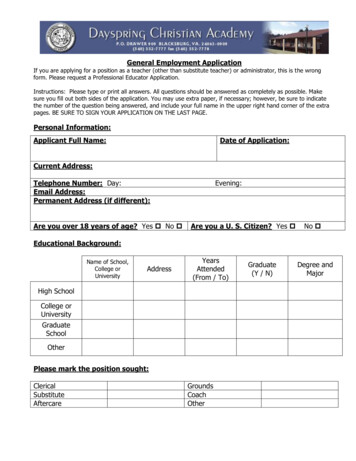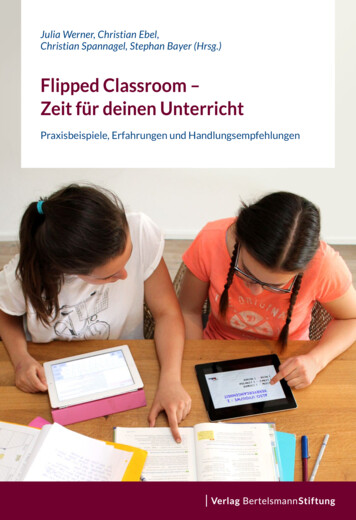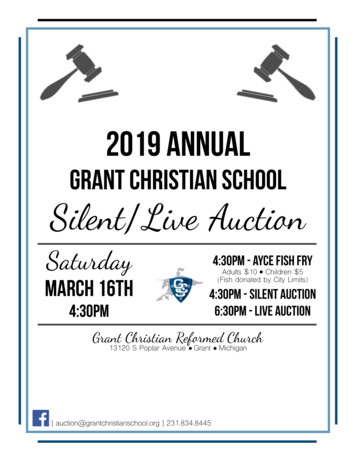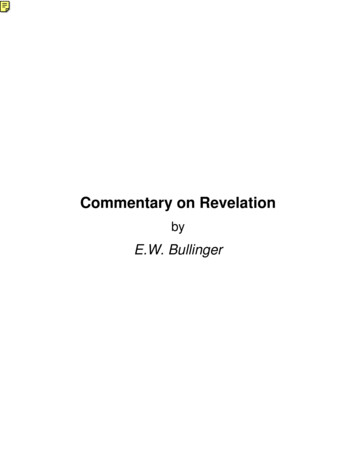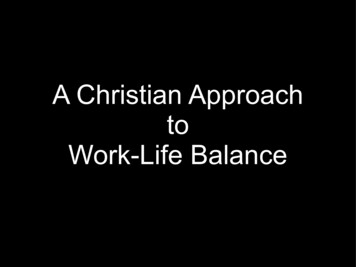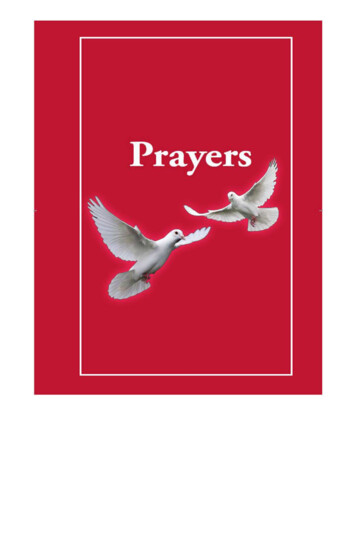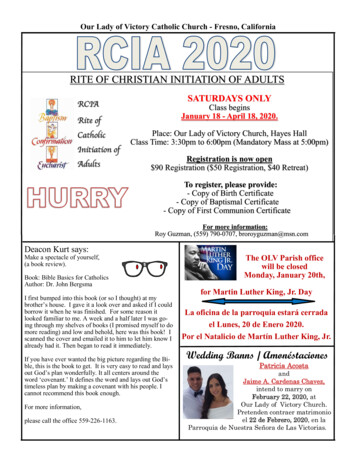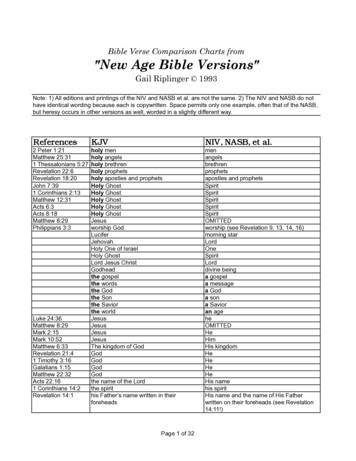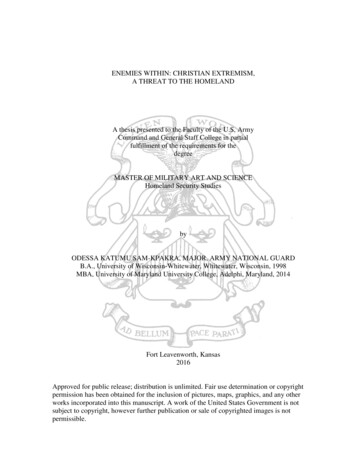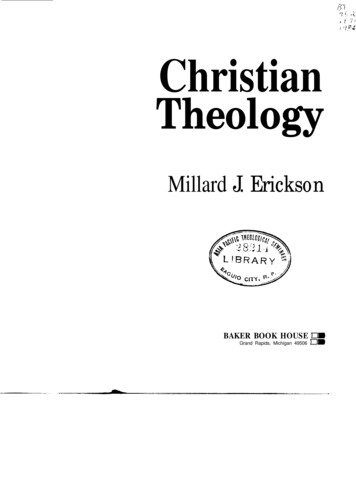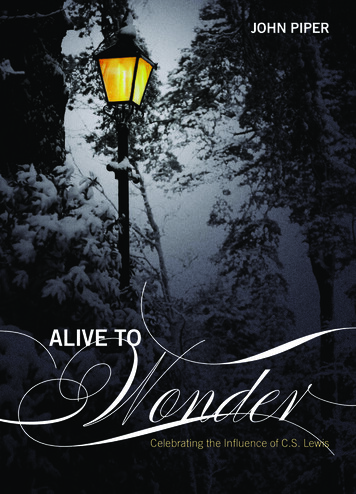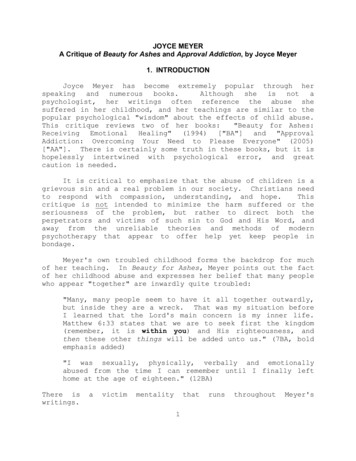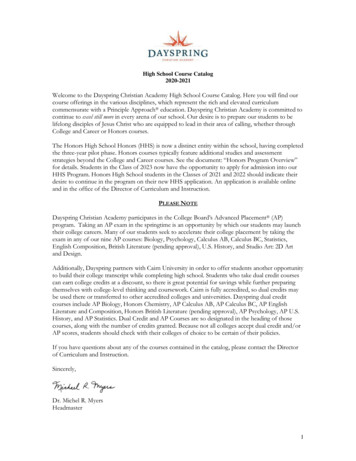
Transcription
High School Course Catalog2020-2021Welcome to the Dayspring Christian Academy High School Course Catalog. Here you will find ourcourse offerings in the various disciplines, which represent the rich and elevated curriculumcommensurate with a Principle Approach education. Dayspring Christian Academy is committed tocontinue to excel still more in every arena of our school. Our desire is to prepare our students to belifelong disciples of Jesus Christ who are equipped to lead in their area of calling, whether throughCollege and Career or Honors courses.The Honors High School Honors (HHS) is now a distinct entity within the school, having completedthe three-year pilot phase. Honors courses typically feature additional studies and assessmentstrategies beyond the College and Career courses. See the document: “Honors Program Overview”for details. Students in the Class of 2023 now have the opportunity to apply for admission into ourHHS Program. Honors High School students in the Classes of 2021 and 2022 should indicate theirdesire to continue in the program on their new HHS application. An application is available onlineand in the office of the Director of Curriculum and Instruction.PLEASE NOTEDayspring Christian Academy participates in the College Board’s Advanced Placement (AP)program. Taking an AP exam in the springtime is an opportunity by which our students may launchtheir college careers. Many of our students seek to accelerate their college placement by taking theexam in any of our nine AP courses: Biology, Psychology, Calculus AB, Calculus BC, Statistics,English Composition, British Literature (pending approval), U.S. History, and Studio Art: 2D Artand Design.Additionally, Dayspring partners with Cairn University in order to offer students another opportunityto build their college transcript while completing high school. Students who take dual credit coursescan earn college credits at a discount, so there is great potential for savings while further preparingthemselves with college-level thinking and coursework. Cairn is fully accredited, so dual credits maybe used there or transferred to other accredited colleges and universities. Dayspring dual creditcourses include AP Biology, Honors Chemistry, AP Calculus AB, AP Calculus BC, AP EnglishLiterature and Composition, Honors British Literature (pending approval), AP Psychology, AP U.S.History, and AP Statistics. Dual Credit and AP Courses are so designated in the heading of thosecourses, along with the number of credits granted. Because not all colleges accept dual credit and/orAP scores, students should check with their colleges of choice to be certain of their policies.If you have questions about any of the courses contained in the catalog, please contact the Directorof Curriculum and Instruction.Sincerely,Dr. Michel R. MyersHeadmaster1
Table of ContentsBIBLE .3CLASSICAL .4ENGLISH .5FINE ARTS: ART.7HISTORY.9LANGUAGES . 11MATHEMATICS . 13PHYSICAL EDUCATION . 15SCIENCE . 16EXTRA-DEPARTMENTAL SUBJECTS . 182
BIBLEChristology & SoteriologyGRADE NINEFOUR QUARTERS; 1.0 CREDITThe definition of Christology is the study of the person of Christ. Soteriology is the study of His work.This course seeks to develop an understanding of Christ’s eternal existence as one of the personsof the triune Godhead as well as His dual nature (full deity and full humanity); His incarnation; Hisearthy life and ministry, including His death, resurrection, ascension; His current ministry; and Hisfuture return and reign. His preeminence in history and in the life of a believer is emphasized.Significant time is given in the use of apologetics arguments, specifically, pertaining to thereliability of Scripture and Jesus’ historical reality, deity, crucifixion and resurrection.Christian DoctrinesGRADE TEN OR ELEVENFOUR QUARTERS; 1.0 CREDITThis course presents an in-depth look at the ten major doctrines found in the Holy Bible.These include Bibliology, Paterology, Christology, Pneumatology, Anthropology,Hamartiology, Soteriology, Angelology, Ecclesiology, and Eschatology. The studentsconsider what a worldview is through a study of the book of Ecclesiastes. Ten disciplines –theology, philosophy, ethics, biology, psychology, sociology, law, politics, economics, andhistory – are viewed from a secular humanist, Marxist/Leninist, Hindu, Islamic, CosmicHumanist, and Postmodern perspectives and are compared with Biblical Christianity.Solutions to life’s challenges are searched out in Scripture, and the strength and power of atruly biblical worldview is verified.HermeneuticsGRADE TEN OR ELEVENFOUR QUARTERS; 1.0 CREDITStudents learn disciplines of biblical hermeneutics (interpretation). Students apply studies ofsurface meaning, science, geography, history, culture, literature, and language, including aword study in the original language (Hebrew or Greek), to their treatment of a chosen Biblepassage, with a view to unlocking a depth of meaning and a breadth of application. Upon thestudies on the passage, students compose an essay of interpretation and application, andpresent it orally or online.Worldviews AnalysisGRADE TWELVEFOUR QUARTERS; 1.0 CREDITStudents further develop and demonstrate a biblical worldview and a facility for generalworldview dialogue by reviewing and analyzing key documents and other media fromWestern history, with a focus on modern—especially visual—media, and by engaging indiscussion and debate with those of differing worldviews. The primary worldviews studiedinclude Islam, Cosmic Humanism and its many related religions (such as Hinduism,Buddism, New Age), Postmodernism, Marxism, Secular Humanism, Rationalism, andBiblical Christianity.3
CLASSICALLogicGRADE TENTWO QUARTERS; 0.5 CREDITStudents study the biblical foundation of logic and begin the critique and construction oflogical arguments. Students study and compose propositions, syllogisms, and sophisms(fallacies) from Isaac Watts’ approach; another, more modern, approach to argumentanalysis (including the discovery of fallacies) will also be followed. The Lincoln-Douglasdebate structure is presented. Students prepare and engage in a formal debate.RhetoricGRADE TENTWO QUARTERS; 0.5 CREDITStudent develop “the art of speaking with propriety, elegance and force” (Webster, 1828).Students follow biblical models of composition, then practice techniques of effectivedelivery, with attention given to volume, enunciation, articulation rate and pause, inflection,facial expression, eye contact and gesture.4
ENGLISHAmerican Literature I (Colonial Period – Federal Period)GRADE NINEFOUR QUARTERS; 1.0 CREDITStudents engage in the reading and study of American literature spanning the ColonialPeriod to 1865. This literature is fiction, including prose and poetry, and non-fiction,including sermons and essays. The course also includes writing (oration and literary analysis)and speaking and listening (orations and memorized poetry) supported by the formal studyof grammar and vocabulary.American Literature II (Civil War Perioid – Twentieth Century)GRADE TENFOUR QUARTERS; COLLEGE AND CAREER, 1.0 CREDITHONORS COURSE, 1.3 CREDITS [SUMMER REQUIREMENTS]Students engage in the reading and study of American literature spanning 1865 through theTwentieth Century. This literature is fiction, including prose, drama, and poetry. The coursealso includes writing (oration and literary analysis) and speaking and listening (orations andmemorized poetry) supported by the formal study of grammar and vocabulary. The honorslevel of this literature course is designed for academically motivated students who areinclined to engage in research and a high level of self-directed academic scholarship.British LiteratureGRADE TWELVEFOUR QUARTERS; COLLEGE AND CAREER, 1.0 CREDITDUAL CREDIT HONORS/AP COURSE (PENDING APPROVAL) 1.3 CREDITS [SUMMER REQUIREMENTS]Students study British literature, including poetry, essays, drama, and the novel from theAnglo-Saxon Period through the Twentieth Century. Students in the dual credit honors/APcourse launch their understanding of literary theory and criticism, both of which are essentialto the study of literature. The honors level of this literature course is designed foracademically motivated students who are inclined to engage in research and a high level ofself-directed academic scholarship.English Language and CompositionGRADE ELEVENFOUR QUARTERS; COLLEGE AND CAREER, 1.0 CREDITDUAL CREDIT HONORS/AP COURSE, 1.3 CREDITS [SUMMER REQUIREMENTS]Students read and analyze a wide variety of non-fiction and fiction literature; they developdiscernment in their appreciation of authors’ ideas and the expression of those ideas. Theyexamine the strategies that authors use to achieve their purposes. Students compose in avariety of modes, applying principles of logic, grammar and rhetoric. The course alsoincludes speaking and listening (orations and memorized poetry) supported by the formalstudy of grammar and vocabulary. The honors level of this course is designed foracademically motivated students who are inclined to engage in research and a high level ofself-directed academic scholarship.5
EL English Courses (EL/International Students)English FoundationsALL GRADESFOUR QUARTERS; 1.0 CREDITThis is an entry-level course specifically designed for international high school students. Itemphasizes the development of the foundational skills of communication, particularlyspeaking and writing, with the goal that students will speak and write excellently in a mannerthat glorifies God. The course includes instruction in English grammar, composition,reading, oral presentation, vocabulary acquisition, as well as a basic research strategies andpractices. The course also contains a study of the elements of literature with a foundationalanalysis of one classic novel. The instructor addresses specific writing tendencies of Englishlanguage learners and how to avoid common errors.English Grammar and CompositionALL GRADESFOUR QUARTERS; 1.0 CREDITThis is a second-year course in which students further develop skills of listening, speaking,reading, writing, and critical thinking requisite for effective communication of information,ideas, and concepts in a manner that glorifies God. This ESL course includes extensiveinstruction and practice in English grammar, composition, vocabulary, and researchstrategies. Additionally, students refine their study skills of outlining, listening, note-taking,paraphrasing, and summarizing and apply these to research projects and specific Biblereadings. Students also identify elements of literature and analyze one classic novel andseveral poems, as well as make personal application of biblical and literary themes.Rosetta Stone American EnglishALL GRADESTWO-FOUR QUARTERS; 0.50 TO 1.0 CREDITThis is a computer-based immersive language-learning method offered by DayspringChristian Academy to the English learner. It is designed to support the student in acquiringEnglish as a second language through the modalities of speaking, listening, reading, andwriting. Students schedule to take this 0.5- or 1.0-credit course during the school day inaddition to taking English Foundations and/or English Grammar and Composition.Course Foundations for ESL/International StudentsALL GRADESCourses for which the international or ESL student’s English language ability warrantscourse modifications beyond the first quarter transition period will be identified on thetranscript as a foundations course for that specific course and will be identified as such onthe report card comment.6
FINE ARTS: ARTArtGRADE TEN OR ELEVENFOUR QUARTERS; 1.0 CREDIT (ONE 1.0-CREDIT ART COURSE IS A PREQUISITE FOR ART II AND AP STUDIO ART)Students study the rise and fall of ideas, artistic expressions, and values evidenced in themajor art eras from Rome to the present. Special consideration is given to the cause-effectrelationship between art and environment, as well as worldview impact on each era andtransition. Students are directed toward art as a career, as a ministry, or as an expression ofpersonal creativity and develop a portfolio for art school, if applicable. Students gain abiblically founded, articulate view of a selected art (or related) term via a word study andartistic response, and they create projects that reveal Christian excellence, biblical thinking,clarity of thought, and relevance to the individual art based upon each studied era. Specialemphasis is given to selected art movements and associated key characteristics. This coursewill rotate with another art course (TBD) on a biennial basis.Field study: The Philadelphia Museum of Art (1 day); ACSI Fine Arts Festival (1 day; byinvitation)Art IIGRADE TWELVEFOUR QUARTERS; 1.0 CREDIT (PREREQUISITE: A 1.0-CREDIT ART COURSE)Students develop their art skills through detailed instruction and practice of selected media.The impact of the Enlightenment is examined through the shift of worldview in society asthe fruit and thorns of such changes in thinking are identified. Specifically, the developmentof art is traced from “Luncheon on the Grass” and Impressionism through Dadaism tocontemporary modern art. Historical responses, like the PRB, and their role in the art worldtoday are studied and discussed. Key movements are scrutinized as case studies and variousprojects serve as experiential study. After a historical backdrop to the state of the arts todayhas been laid, the impactful relationship between relativism and Modern and Postmodern artis examined. Students grapple with the appropriate response and/or integration into thecontemporary art world and deduce their Christian role and response to art today.Field study: Lancaster City/Gallery Row; ACSI Fine Arts Festival (1 day; by invitation)AP Studio Art: 2-D Art & DesignGRADE TWELVE (PREREQUISITE: A ONE-CREDIT ART COURSE AND TEACHER APPROVAL)FOUR QUARTERS; AP COURSE, 1.3 CREDITS [SUMMER REQUIREMENTS]This course for advanced art students follows the prescribed College Board AdvancedPlacement (AP) curriculum and promotes artistic development as students explore theprocess of sustained investigation in art and its documentation. Students develop mastery(i.e., “quality”) in concept, composition, and execution of 2-D design. Students develop acoherent plan of action—a concentration—from which to craft a cohesive body of workinvolving the investigation of a strong underlying visual design idea. Students also explore avariety of concepts and approaches in 2-D design so that they are able to demonstrateversatility in techniques through one or more media. The course includes student analysis oftheir own artwork and that of their peers. Students consider artistic integrity and whatconstitutes plagiarism as they develop a portfolio.Field Studies: Lancaster City/Gallery Row (1 day); ACSI Fine Arts Festival (1 day; byinvitation)7
FINE ARTS: MUSICChoirALL GRADESFOUR QUARTERS; 1.0 CREDITThis is a non-auditioned, elective course; all interested students are encouraged tojoin. Students rehearse and perform music from a variety of genres includingsacred, contemporary, classic choral literature, and spirituals. Students learn basic sightreading with solfege and rhythm reading with counting. They also learn to sing in foreignlanguages, practice good vocal technique, and perform in four-part harmony withsome divisi. High school choir performs at school concerts and other events including thePatriot's Celebration Dinner and Remember America Speaker Series. Students are requiredto purchase choir attire in their first year in high school choir, a cost of approximately 100.Field Study: ACSI Fine Arts Festival (1 day)MusicianshipGRADE TEN OR ELEVENFOUR QUARTERS; 1.0 CREDITThis class reviews the basics of reading musical notation then advances to keysignatures/circle of 5ths, chord theory, intervals, and advanced rhythm. Students buildpractical musicanship skills through ear training, writing musical dictations, sight singing,bucket drumming, and individual keyboard practice. In singing, drumming, and keyboards,students are based on their individual progress, advancing from their skill level upon enteringthe class. This course will rotate with another music course (TBD) on a biennial basis.Performance ChoirGRADES TEN, ELEVEN, TWELVEFOUR QUARTERS; 0.2 CREDITS (IN ADDITION TO THE 1.0 CREDIT FOR HIGH SCHOOL CHOIR)This is auditioned choir designed for students with more advanced musicianship skills.Students in Performance Choir also participate in High School Choir. This grouprehearses one period per 6-day cycle.Students are required to log individual practice time athome, usually 45 minutes per week. Students rehearse and perform more challengingliterature with an emphasis on vocal blend, divisi and jazz harmony, diction, and a cappellasinging. Performance choir performs at school concerts and other events including thePatriot's Celebration Dinner, Remember America Speaker Series, and Christmas caroling.Field Studies: ACSI Fine Arts Festival (1 day); Christmas caroling in local retirementcommunities (1 day)8
HISTORYEconomicsGRADE TWELVETWO QUARTERS; 0.5 CREDITThe science of economics is studied from a position of discerning a biblical model forscarcity, choices, private property, work, stewardship, production and the distribution ofgoods, services, and wealth. Monetary systems and markets as well as the government role inthe economy are also examined. Practical economics suggests an actual use of previouslylearned mathematical knowledge and theories as they relate to life skills. Students discernwise, biblical practices related to personal finance. Specific subtopics include saving,budgeting, debt, career planning, consumer awareness, investing and retirement, insurance,taxes, giving, and the effects of money on relationships.History of ChristianityGRADE TWELVETWO QUARTERS; 0.5 CREDITThis course is an introduction to the 2000-year history of the Christian Church. The courseoffers a general overall understanding of the major people and events in the history of theChurch of Jesus Christ. At the feast of Pentecost, the Christian Church was instituted withthe coming of the Holy Spirit, which Peter said was a fulfillment of the prophecy of Joel.From this humble beginning with 120 disciples (Acts 1:15), the Church eventually spread tocover the whole earth, fulfilling Jesus’ injunction to take the Gospel to the ends of the earth(Acts 1:8). As the history of the Church unfolds over the period of 2000 years, studentsdifferentiate between the human institution of the church from the divine institution of thebody of Christ whose head is the Incarnate Son of God, Jesus Christ, and whose directivesare through the divine authority of the Holy Scriptures, God’s written revelation to mankind.This historical journey of both the human and the divine is significated by God’s directintervention, the intrigu
Dayspring Christian Academy participates in the College Board’s Advanced Placement (AP) program. Taking an AP exam in the springtime is an opportunity by which our students may launch their college careers. Many of our students
